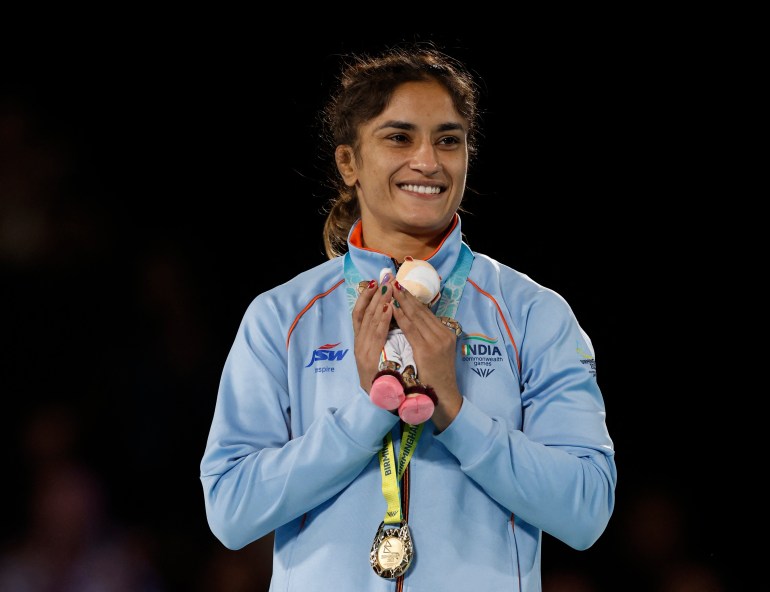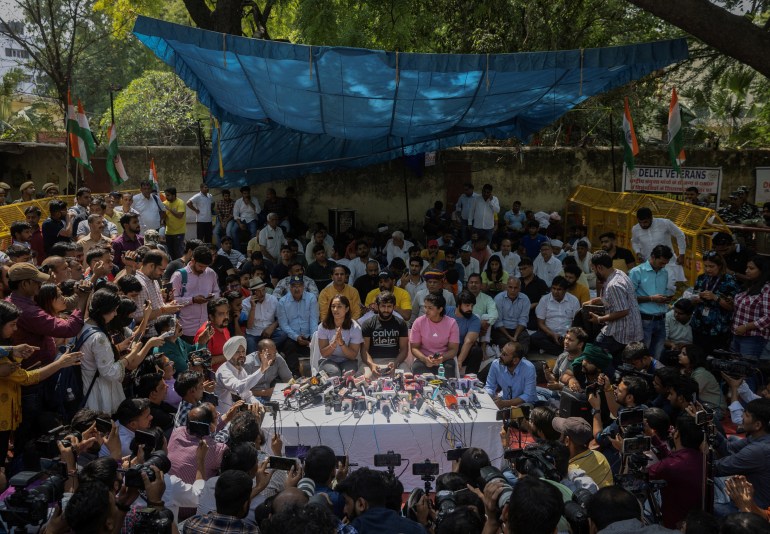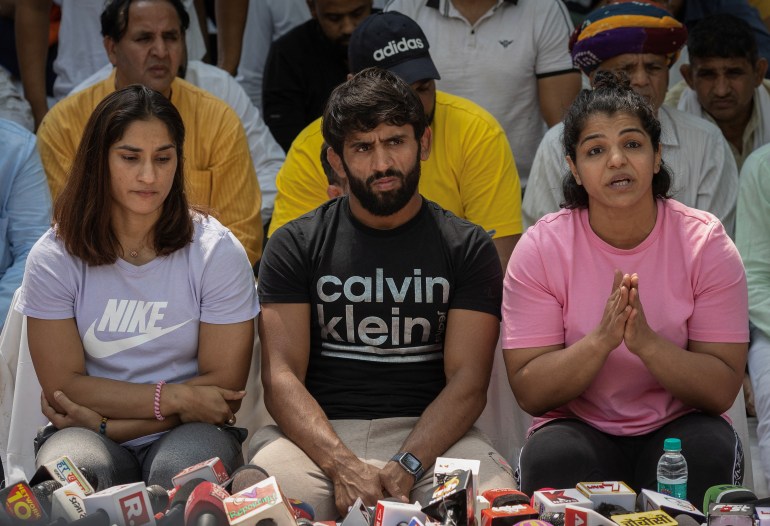New Delhi, India – Olympic wrestler Vinesh Phogat joins her palms and pretends to hold her niece as a newborn as she talks about the “trigger point” that made her decide to protest the sexual harassment of women wrestlers in India.
“I started thinking about my brother’s [now 9-year-old] daughter who started wrestling,” 28-year-old Phogat told Al Jazeera during a sit-in in the Indian capital New Delhi.
“Somehow we managed to struggle, we fought and reached certain heights in this game. But to push her and other girls into this when we know how bad it is… I just couldn’t.
It’s been almost three weeks since some of India’s top wrestlers – Olympians and world champions – took to live again on a footpath in central Delhi to mark the removal and arrest of Wrestling Federation of India (WFI) President Brij Bhushan Sharan Singh , to demand. for alleged sexual harassment of female athletes for more than a decade.
Seven female wrestlers, including a minor, have reported him to the police; accusing him of stalking, touching them with sexual intent, making sexual remarks and “insulting their modesty”.
According to news reports, two wrestlers claim that Singh touched their breasts and stomachs several times under the pretext of checking their breathing. He would have done it in a restaurant, at a tournament and at the WFI office.
The wrestlers want a thorough police investigation that, they said, will only be possible if Singh — who is serving his sixth term as a member of parliament from the ruling Bharatiya Janata Party (BJP) and has been the WFI president since 2012 — is arrested.
Singh has denied all allegations and has refused to quit.
“If they can prove even one charge, if they have a video, if I called someone, if they have evidence, I’m ready to be hanged,” he said.
He has claimed the protest is politically motivated and, without naming names, said the wrestlers were backed by an opposition politician and an industrialist.
The protests initially started on January 18, when about 30 top Indian wrestlers – men and women – started a sit-in against Singh in Delhi after wrestlers’ complaints of sexual harassment. They stubbornly kept their protest apolitical, not allowing any politician to even sit with them.
Three days later, they ended their protest after receiving assurances from Sports Minister Anurag Thakur that an oversight committee had been set up to investigate the allegations against the WFI chief. Thakur also said all WFI activities had been suspended and Singh had been asked to “step aside” until the investigation was completed.
Although the commission’s findings have been presented to the Ministry of Sport, they have not been released and the wrestlers took to the streets again on April 23.
On April 25, the sports ministry said the committee’s “key findings” were that the WFI had no internal complaints committee, which is required by law. The ministry did not comment on the allegations against Singh and he has since returned to chairing national wrestling tournaments.
That same day, the wrestlers petitioned the Supreme Court to force authorities to file an initial information report, which forms the basis of the investigation. Three days later, police recorded two FIRs.
Prerna Singh, a lawyer who handles cases of sexual assault against minors, said the procedure laid down by law is clear and strict.
“Immediate registration of FIR, arrest of the suspect in minor cases, followed by questioning and filing of charges. What the wrestlers demand is their right,” she told Al Jazeera.

Phogat, who won her third consecutive Commonwealth Games gold medal in 2022, led the sit-in of about 20 to 25 people, along with Olympic bronze medalist Tokyo Bajrang Punia and Olympic bronze medalist Rio Sakshi Malik – with a great risk to their career.
All of the protesting wrestlers have opted out of ranking series and tournaments, and some have threatened to return their state-awarded medals.
Phogat said protesters have been mistreated by police – including on May 4, when police tried to physically stop them from bringing folding cots to sleep on because the footpath and their mattresses were wet from the torrential rain.
However, despite their dedication, they have taken on a powerful figure in Singh, who has long-standing and deep ties to the ruling party.

‘We thought we had a simple question’
Wrestling is arguably India’s most successful Olympic sport. In the 75 years since India’s independence, India has won 21 Olympic medals in individual sports, six of which were won by wrestlers.
Most wrestlers come from villages, many of them from poor families. And most of them come from Haryana, an agricultural and highly patriarchal area with high rates of female feticide and honor killings.
Women athletes have long complained about sexual harassment in their sport, though they have been reluctant to speak out publicly.
“Many athletes have told me that they are victims of various forms of exploitation, but they don’t want to come out when they are at their best,” sports lawyer and activist Saurabh Mishra told Al Jazeera.
“Seeking favors is not rare – financially, sexually,” Mishra added. “In my opinion, the biggest culprits are the sports federation officials who run their fiefdoms.”
Phogat said several cases of sexual harassment have been reported in the past, but Singh managed to get the charges dropped or ensure the complainant did not rejoin.
Recently, Phogat said, she received a call from young female wrestlers from a state in eastern India.
“They had written a complaint to the WFI about sexual harassment by a coach. The coach was suspended for 10 days, but returned as head coach after seven days. This is the culture [of the WFI]. If the head himself is like this, what action will he take against others? she said.
The protesting wrestlers have refused to share the names of the women who have complained as details of sexual harassment incidents that could be embarrassing for the survivors, nor will they allow the girls to come forward.
“The background, the villages we come from, the people there are not that educated. And [the girls] have to live there. They cannot move to London or [Mumbai]. If their names are not known, it can become very difficult to leave the house,” said Phogat.
But the star wrestlers protect the victims and risk their own careers by taking on not only a powerful man, but by extension the government.
The BJP, usually quick to claim the success of Indian athletes as a result of Prime Minister Narendra Modi’s sports programmes, has ignored the protests.
Singh is a longtime BJP heavyweight from Uttar Pradesh with significant influence in India’s most populous state, electing 80 out of 543 legislators.
Singh, often referred to as “Bahubali” (strong man), is believed by many to enjoy immunity from his financial power, political clout and reputation.
Charged with involvement in the 1992 destruction of Babri Mosque, he has a criminal record dating back to the 1990s, when he was convicted of aiding associates of mobster Dawood Ibrahim. Four criminal cases are pending against him, including for theft, attempted murder and illegal payments in connection with an election.
In interviews with select channels since the sit-in protest began in April, Singh has responded with defiance and counter-accusations.
During a TV interview, when asked about the sexual harassment allegations, Singh lashed out.
“First they say it was a hundred girls, now they say it’s a thousand,” he said. ‘Did I eat chapatis made from shilajit? [an aphrodisiac]?”

Meanwhile, support for the protests appears to be growing among Indian athletes and the wider public.
Many of India’s top athletes, including six-time Grand Slam champion Sania Mirza, Tokyo Olympic champion Neeraj Chopra and cricketer Virendra Sehwag have expressed their support, and several politicians, rights activists and farmers’ unions have now joined their protest.
Every few days, #IStandWithMyChampions trend on Twitter and fans and supporters hold candlelight marches across the country.
At the protest site, amid checkpoints and a heavy police presence, the protesting wrestlers have attempted to maintain a basic daily routine that begins with jogging and exercise in the early morning. But as the standoff continues, their concerns grow.
“It’s an important year. There are Asian Games [in September], then Olympic qualifications. We didn’t think our battle would last this long. We thought we had a simple demand and the government would agree [to remove Singh]but the government is not willing to take action,” Malik, 30, told Al Jazeera.
“We don’t know if anyone cares, [but] we will stay here until he is punished for his crimes.’
Phogat said the protesters simply want basic rights respected.
“We don’t want to fight. We want solutions. We want a guarantee that there will be no sexual harassment while wrestling,” she said, before adding, “It’s easy to say we want this and that, but nothing is bigger than politics in this country.”